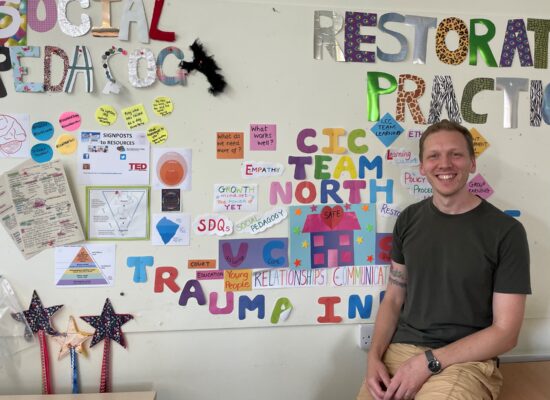Earlier this month, Lincolnshire County Council became one of only six local authorities across England to receive a second consecutive outstanding rating from Ofsted.
The inspectorate hailed the quality of social work as “outstanding”, finding the calibre of child and family assessments “consistently strong”, praising the “excellent practice” with children with disabilities and lauding the trusting relationships practitioners built with families and children in care.
Rating the authority as outstanding for leadership, Ofsted found “visible and approachable” leaders had created an environment in which such high-quality practice could flourish, including by investing in business support to ease practitioners’ workloads and promoting career development.
Building strong relationships with children

LCC/ Nathan Hufton
Practice with children in care was also graded outstanding.
Nathan Hufton, an advanced practitioner in the children in care team, says: “It’s really nice to see the work that we’ve been doing being recognised again. We put in the work and we build the relationships and really try our best for every one of our families.”
The Ofsted report endorsed his words by highlighting the strong bonds social workers foster with the children they support, creating a trusting environment where children can share their worries and aspirations.
“Children in care was why I got into social work,” said Nathan. “The young people are just awesome. And for me, it is the fun of just working with teenagers, and building those relationships.”
He points to one of the youngest children he works with – a seven-year-old – for whom he successfully secured a foster family.
“We’d done a lot of work around understanding what a foster family was and what families were. In a year, we did the work together – reading ‘The Great Big Book of Families’ – and we saw her level of concentration and reading improve.” (‘The Great Big Book of Families’ is not a social work-specific book but it can be used to show children that family structures vary. It also includes references to living with other family, care, and adoption.)
Having the right environment, the right foster family and access to therapeutic care are what have helped her to settle and thrive, Nathan adds.
I am pleased and proud that the hard work and commitment of the teams in Lincolnshire – Heather Sandy, Lincolnshire’s director of children’s services
And Nathan believes that Lincolnshire’s robust learning culture, along with training on Signs of Safety and trauma-informed and restorative practices, helps to promote professional curiosity, creating the right environment for high-quality practice.
When one of the children he works with said she wanted more freedom and felt like Nathan was being a little overprotective, it was an opportunity for him to reflect on his training and adjust his level support in line with the wishes of the child.
Reflecting this, the Ofsted report praised social workers for the work they did to ensure the views and wishes of children were included in their care plans.
Praise for child protection practice
As with children in care, Ofsted rated Lincolnshire’s provision for children who need help and protection as outstanding.
Inspectors found that the vast majority of decisions at the front door to transfer children to the family assessment and support team (FAST) service for an assessment were “appropriate and timely”.
Strategy meetings were held promptly and, when children were subject to a child in need or child protection plan, review meetings were held regularly and were well attended by partners who knew the child, Ofsted added.

LCC/ Nathan Cattle
Nathan Cattle, a social worker in the West Lindsay FAST team, was directly involved in working with Ofsted staff during the inspection.
He said inspectors were impressed with the responsive and effective way he dealt with a section 47 child protection enquiry.
This involved a young child who had an injury and a parent who was under the influence of alcohol. Due to its urgency, a safety plan had to be created in a short space of time to support the safety and wellbeing of the child.
“I needed to pull everything together as quickly as possible so I did it within my duty week, so I could come up with the safety plan. And the family, so far, are sticking to it. Ofsted seemed impressed with how I managed to pull it together,” he says.
“I love the work that I do and I’m really passionate about this job,” Nathan adds. “And I think that the outstanding [rating] that we got is the validation that we’re definitely doing something right.”
Voice of the child
Nathan Cattle also highlights how, through developing his relationships with children and families and prioritising the voice of the child, he has been able to better support these children.
The Ofsted report highlighted how, through the direct work tools routinely used with children, social workers were able to ensure the child’s voice remained at the centre of the work they did with them and their family.
Nathan adds: “In my view, there’s absolutely no reason as to why every assessment shouldn’t have some element of the voice of the child in it. For example, within private law proceedings, the voice of the child is paramount, particularly if parents are at loggerheads over whom the child should live with.
“I have had children – in their own words and in their own handwriting – write a letter to the judge and it was so impactful in giving the parents another perspective on what the child was experiencing.”
A supportive culture
The report said that the culture of promoting positive relationships with, and outcomes for, children came from senior leadership. Ofsted found they had a “clear vision” for, and a “strong focus” on, delivering high-quality children’s services, including through developing their workforce.
A targeted recruitment strategy has led to an increase in the number of permanent social workers, with the council investing in market supplements and in increasing the number of social work apprentices.
Leaders have also supported social workers by providing them with team assistants to take on business support tasks. As a result, the workforce is more stable and workloads more consistently manageable.
Nathan Cattle and Nathan Hufton both applaud the support they receive from their managers, through case and personal supervision, and feel senior leadership are visible and available in helping them to achieve the best for families, a point echoed by Ofsted.
‘Fantastic work’
“We wouldn’t be in this job if we didn’t think that people were capable of positive change,” says Nathan Cattle.
“Social work is one of the most stressful jobs on the front line but the positives that we see day in day out make it all worthwhile because there are some real success stories.
“The outstanding rating is a celebration of the good that we do day in and day out that the general public don’t get to see. If families or people within our area see that we have been given an outstanding rating, it’s going to potentially give them the confidence and trust if we need to work with them in the future.”

Heather Sandy, director for Lincolnshire children’s services
Responding to the outstanding judgment, Lincolnshire’s executive director of children’s services, Heather Sandy, says: “I am pleased and proud that the hard work and commitment of the teams in Lincolnshire and the fantastic work they do every day to protect and support children and families has been recognised within this inspection and is reflected in the outstanding Ofsted judgment.”




 Facebook
Facebook X
X LinkedIn
LinkedIn Instagram
Instagram